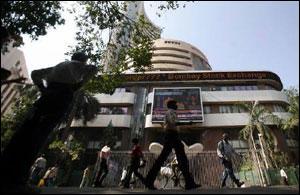 | « Back to article | Print this article |
Going long on Budget day announcement can go horribly wrong, writes Devangshu Datta.
Trading on, or near Budget day is always a tense exercise but it can be very rewarding. Prices move very fast and unpredictably with trends changing by the minute. Everybody makes snap judgements as they listen to the speech. Normal stop losses may be hit and exceeded in the blink of an eye.
 The problem for a trader is that, above all, there is too much information floating around for a human being to process and absorb. The information is also delivered in natural language, which makes it difficult to analyse in real-time by using computers.
The problem for a trader is that, above all, there is too much information floating around for a human being to process and absorb. The information is also delivered in natural language, which makes it difficult to analyse in real-time by using computers.
One way to reduce the noise is to deliberately restrict information flow. Most of us multitask madly while the Finance Minister speaks. We will be listening to the speech, while keeping a lookout for feedback on Twitter, tracking prices on trading terminals, surfing between business channels and probably, fielding phone calls from friends and associates as well.
Consider cutting down on the frenetic monitoring of information sources. The experts on Twitter and the TV business channels are receiving the same information as you, at the same time. They are making guesses, as you are. The chances that one of them will deliver an insight that helps you make an instant killing is very, very low. On the other hand, there are high chances of losing money because you are focussed on deciphering expert-speak at the moment when your position goes bust.
Switch off the TV and log out of Twitter until the speech is over. Put your phone on silent and don't take calls or read texts, unless it's your broker calling. Focus on just two things. One is the audio input of the FM's words (ideally, listen to a webcast or radio, so that you aren't distracted by images of MPs doing interesting things in Parliament). The other point of focus should be the visual input from your trading terminal where the prices change as the FM speaks and the market responds.
Following through on the same logic, you can try to restrict the information flow from your terminal as well. On Budget day, there is no need to follow entire battalions of stocks. Normally stock pickers will try to find the best company in a given industry and of course, the internal dynamics of two companies in the same sector may be very different.
But Budget provisions have sector-wide impacts. Usually every stock in a given sector will develop the same trends in unison. The key factor for trading stocks on Budget day is high liquidity, not the competitive edge one stock possesses versus its peers. If the trend switches suddenly, high liquidity guarantees that you will be able to cut your losses.
Don't fracture your attention by trying to track more than the minimum number of pricelines on that key session. Restrict your price tracking to a few indices and a few market leaders in different sectors.
Track the Nifty and the Bank Nifty among the indices – both are liquid and easily traded. In other sectors, pick a leader and track only that stock. For example, you might choose to follow Hind Unilever (FMCG), L&T (Construction). HDFC (Housing finance), Airtel (Telecom), NTPC (Power). Reliance Capital (NBFCs), BHEL (Capital goods), TCS (IT) etc. You could pick a different stock of your preference in each sector, provided your choice is highly liquid and available on the stock futures segment in case you want to go short.
Also consider another suggestion: Don't take any long-term positions on Budget day itself. Don't meddle with your existing portfolio. You may later offload or rebalance your long-term portfolio. You may later convert short-term positions taken at the Budget into long-term positions.
But make the long-term decisions later, only after you are sure you understand the full implications and you've had a chance to look at the fine print. On Budget day, you're taking punts on sketchy information and guesswork. Such positions can go disastrously wrong and you should not commit yourself to long-term investment decisions on such a basis.